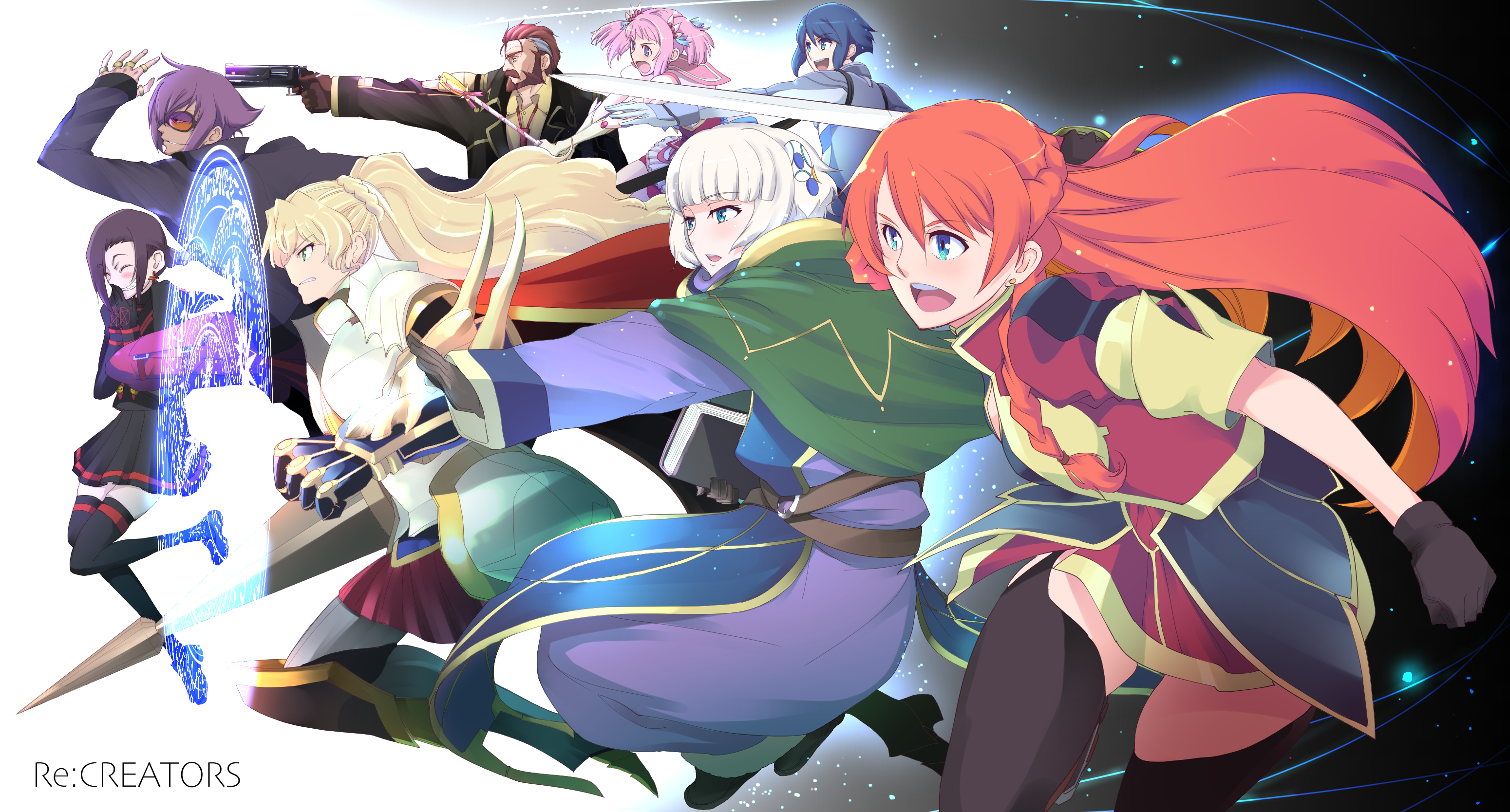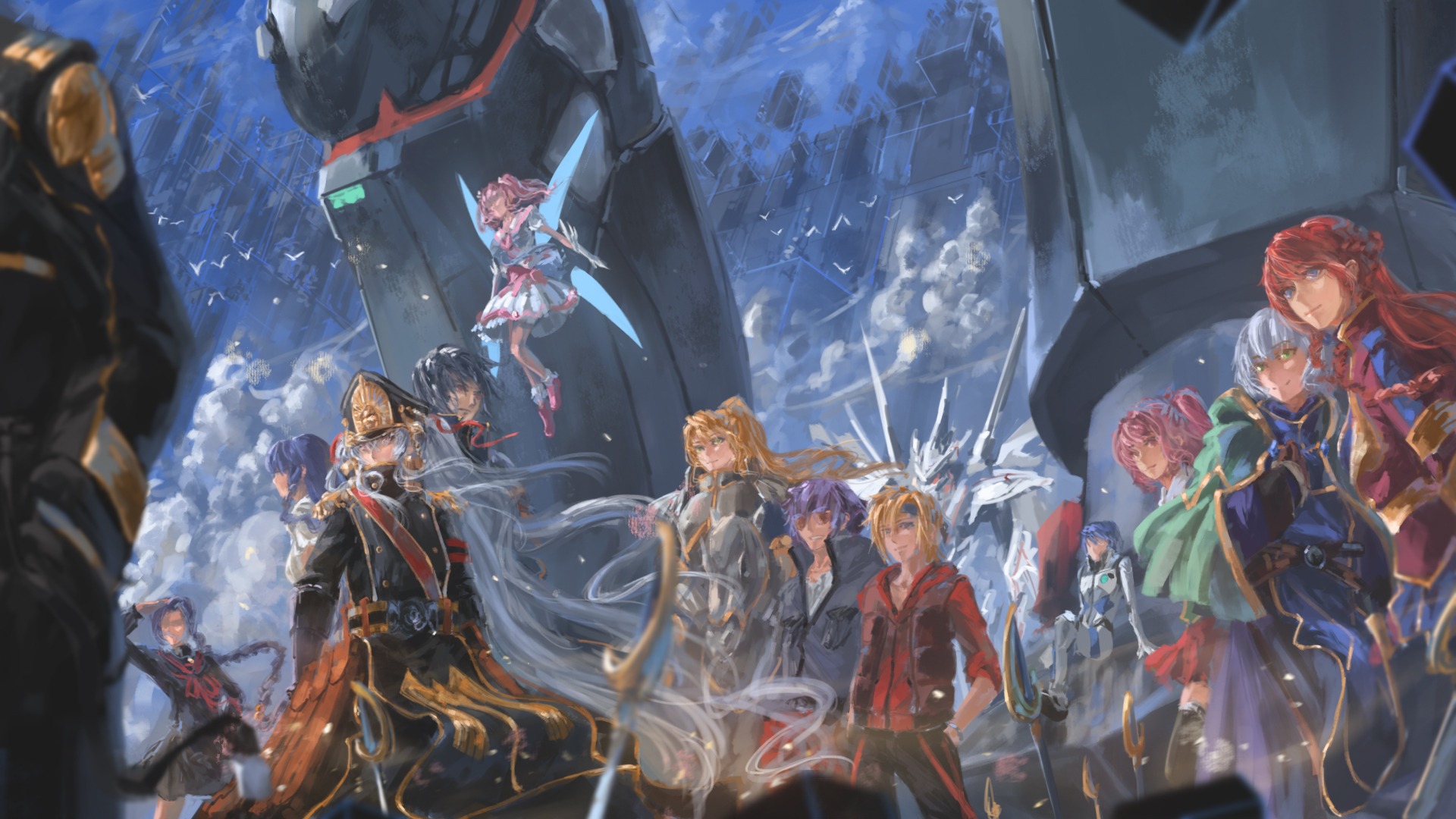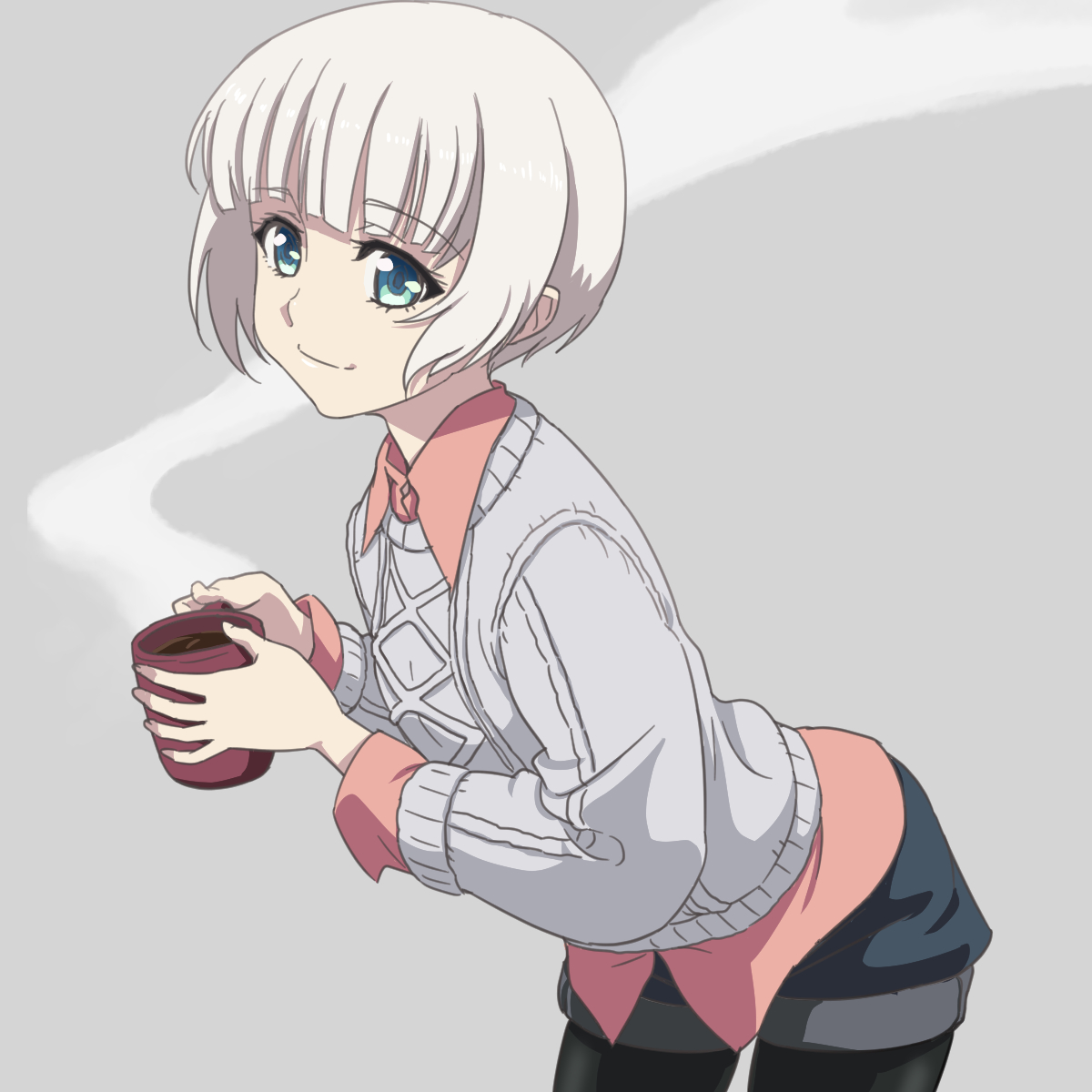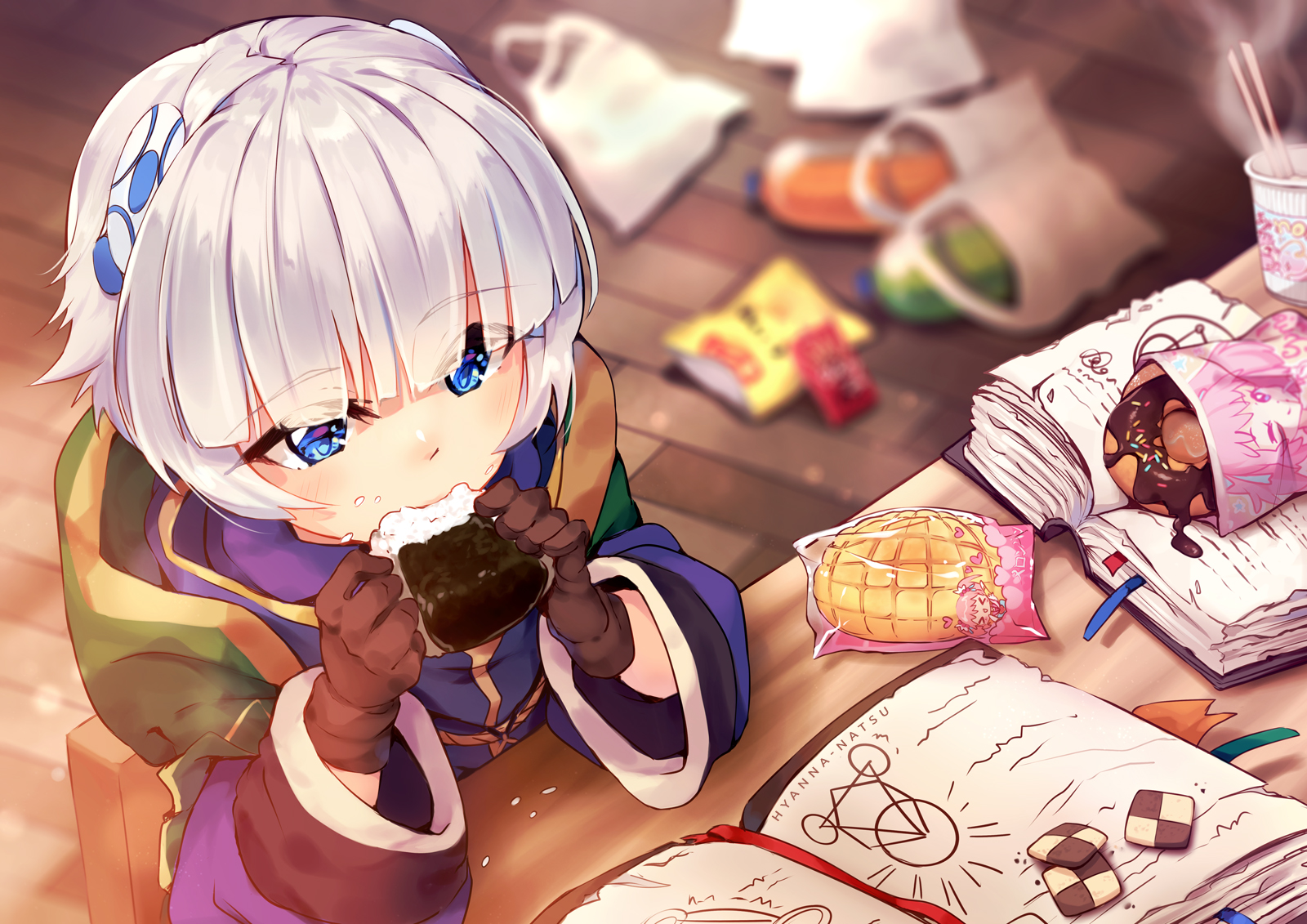Dunkag on Nostr: Finished a rewatch of Re:Creators last night, so I figured I'd post about it a bit. ...
Finished a rewatch of Re:Creators last night, so I figured I'd post about it a bit.
I'll be honest, I'm a little biased here since this series is exactly the kind of thing I adore finding, something less popular that tries to be unique, and has varying levels of quality in execution. It's an appeal you just don't get the with hyper-polished marketable works some try to create. Nor with adaptations that already have a super strong base to work from.
Re:Creators is something rare, a meta-narrative that doesn't try to involve "reality" in the meta. It's a story about stories, the creation of them, our varied feelings towards them, and their relationships with the world as a whole. It's very sincere in presenting this too, not one moment is spent ever acting like it's better than an idea or emotion. If you don't end up trying to meet it on its own level, it can seem campy, but the entire story works well enough at presenting it's two main themes, fiction is important and getting past grief.
Every story is based on a real world one, or at least a real world genre/overarching audience type. You have your fantasy series, your shounen series (with stands because how could they not use JoJo), your dating sim, a magical girl anime, heavy seinen manga, and many others inbetween.
The importance of fiction is a topic the series plays with again and again, people's reactions to viewing works seriously constantly being evaluated. Early on, some of the creations will start to argue with their creators since they cannot see the works eye to eye, one simply being an observer to the other's entire existence. Other creations easily adore the world and the people's reactions to their works, glad to have brought joy and hope to those around them. Creators and other observers aren't always quick to admit fully their desires and emotions in viewing a world, many will disarm the question as nothing more than a silly romanticism of fiction. This is a very real problem of sorts in real life too, many people end up deflecting any deeper connections or thoughts because thinking in these ways about some made up story would just be silly (though admittedly the inverse can be true, over 2 hours is far too much time to analyze any work that isn't overly long in its own right).
The other theme though is mostly reserved for the middle and end of the series, fixing a mistake in your grief. Our two most main characters in the series feel grief over the same person's death, and they both deal with it in very different, but equally mistaken ways. One seeks revenge against a vague concept of what lead to the death, something that will never be fulfilled. Meanwhile the other internalized his struggle far too much, throwing away all evidence of ever having interacted and letting some of his worst thoughts about his own friend bubble up to the surface. These methods of dealing with their grief are very destructive to themselves more than anything, and the series doesn't end with a real solution, but it was never something the series was equipped to address fully, so the minor solutions that are used to solve these specific examples are fine enough to keep everything else rolling smoothly.
For a quick character bit, I liked Sota's rather simple and small progression through the series. He is very unsure of himself from the start, and many ideas are holding him back. Early on, during an encounter he was never prepared for, he nearly got played like a fiddle. While he was smart enough to understand not to agree to the terms he'd been given, he still was devastated hearing his obvious insecurities laid out. He ends up involved in all this simply by accident and it shows with how out of his element he is. By the end though, a repeat of the encounter happens and he understands far better how to hold his ground, only finally breaking once he's pushed to the sheer limit of questions he can tolerate, and his opponent is satisfied. She only wanted an interesting happening, and Sota's newfound conviction told her easily that his desires would be far more interesting for the situation at hand.
If I were to look from flaws, this series is far from perfect. It is far more blatant that I remembered, many scenes stating outright the intended ideas. Certain characters have far too much exposition, while others still have practically none, or at least nowhere near as much as they needed. Also, an entire episode is spent on recap, which makes sense in the middle of airing a long anime after likely a break week or two, but ends up doing no favors to the questionable pacing. Also, the pacing. It's not bad, but it definitely back-loads a lot of the bigger plot points and climaxes for the last 10ish episodes. It also starts a little faster than you'd expect, very early some important story beats happening. This ends up leaving the middle as basically a lore dump since all the stories and events involved within this series are fictional.
This is all far too long at this point, and I just want to say I really do like this series. I suggest giving it a watch if you're into this kind of anime, something experimental that may not always stick the landing, but puts up a damn good fight trying. It's very under-recognized, as it was contending not quite a packed season in terms of shows, but the year itself was somewhat packed and many would've been focused making sure they had caught everything else going on in 2017, such as people getting hit with a sheer mental flashbang at the realization of how quality Kemono Friends was.
Meteora cute.




I'll be honest, I'm a little biased here since this series is exactly the kind of thing I adore finding, something less popular that tries to be unique, and has varying levels of quality in execution. It's an appeal you just don't get the with hyper-polished marketable works some try to create. Nor with adaptations that already have a super strong base to work from.
Re:Creators is something rare, a meta-narrative that doesn't try to involve "reality" in the meta. It's a story about stories, the creation of them, our varied feelings towards them, and their relationships with the world as a whole. It's very sincere in presenting this too, not one moment is spent ever acting like it's better than an idea or emotion. If you don't end up trying to meet it on its own level, it can seem campy, but the entire story works well enough at presenting it's two main themes, fiction is important and getting past grief.
Every story is based on a real world one, or at least a real world genre/overarching audience type. You have your fantasy series, your shounen series (with stands because how could they not use JoJo), your dating sim, a magical girl anime, heavy seinen manga, and many others inbetween.
The importance of fiction is a topic the series plays with again and again, people's reactions to viewing works seriously constantly being evaluated. Early on, some of the creations will start to argue with their creators since they cannot see the works eye to eye, one simply being an observer to the other's entire existence. Other creations easily adore the world and the people's reactions to their works, glad to have brought joy and hope to those around them. Creators and other observers aren't always quick to admit fully their desires and emotions in viewing a world, many will disarm the question as nothing more than a silly romanticism of fiction. This is a very real problem of sorts in real life too, many people end up deflecting any deeper connections or thoughts because thinking in these ways about some made up story would just be silly (though admittedly the inverse can be true, over 2 hours is far too much time to analyze any work that isn't overly long in its own right).
The other theme though is mostly reserved for the middle and end of the series, fixing a mistake in your grief. Our two most main characters in the series feel grief over the same person's death, and they both deal with it in very different, but equally mistaken ways. One seeks revenge against a vague concept of what lead to the death, something that will never be fulfilled. Meanwhile the other internalized his struggle far too much, throwing away all evidence of ever having interacted and letting some of his worst thoughts about his own friend bubble up to the surface. These methods of dealing with their grief are very destructive to themselves more than anything, and the series doesn't end with a real solution, but it was never something the series was equipped to address fully, so the minor solutions that are used to solve these specific examples are fine enough to keep everything else rolling smoothly.
For a quick character bit, I liked Sota's rather simple and small progression through the series. He is very unsure of himself from the start, and many ideas are holding him back. Early on, during an encounter he was never prepared for, he nearly got played like a fiddle. While he was smart enough to understand not to agree to the terms he'd been given, he still was devastated hearing his obvious insecurities laid out. He ends up involved in all this simply by accident and it shows with how out of his element he is. By the end though, a repeat of the encounter happens and he understands far better how to hold his ground, only finally breaking once he's pushed to the sheer limit of questions he can tolerate, and his opponent is satisfied. She only wanted an interesting happening, and Sota's newfound conviction told her easily that his desires would be far more interesting for the situation at hand.
If I were to look from flaws, this series is far from perfect. It is far more blatant that I remembered, many scenes stating outright the intended ideas. Certain characters have far too much exposition, while others still have practically none, or at least nowhere near as much as they needed. Also, an entire episode is spent on recap, which makes sense in the middle of airing a long anime after likely a break week or two, but ends up doing no favors to the questionable pacing. Also, the pacing. It's not bad, but it definitely back-loads a lot of the bigger plot points and climaxes for the last 10ish episodes. It also starts a little faster than you'd expect, very early some important story beats happening. This ends up leaving the middle as basically a lore dump since all the stories and events involved within this series are fictional.
This is all far too long at this point, and I just want to say I really do like this series. I suggest giving it a watch if you're into this kind of anime, something experimental that may not always stick the landing, but puts up a damn good fight trying. It's very under-recognized, as it was contending not quite a packed season in terms of shows, but the year itself was somewhat packed and many would've been focused making sure they had caught everything else going on in 2017, such as people getting hit with a sheer mental flashbang at the realization of how quality Kemono Friends was.
Meteora cute.




